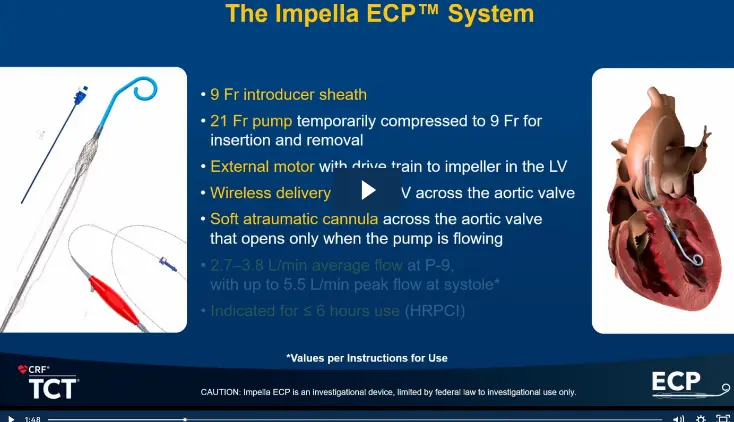Clinical Research & Data, Escalation Therapy, AMI Cardiogenic Shock, Protected PCI
Subanalysis of Women in IMP-IT Registry
Alaide Chieffo, MD, discusses an IMP-IT registry sex subanalysis with Bobbi Bogaev Chapman, MD. Dr. Chieffo is an interventional cardiologist and director of research at San Raffaele Hospital in Milan, Italy.
IMP-IT (IMPella mechanical circulatory support device in Italy) is a multicenter retrospective observational national registry of patients in Italy treated with Impella 2.5®, Impella CP®, Impella 5.0® and Impella RP® for cardiogenic shock and high-risk PCI from 2004 through June 2018. Dr. Chieffo explains that this subanalysis of women in the registry was done to examine why only 22.4% of the patients were women and whether there were differences in the characteristics of the male and female populations.
Dr. Chieffo highlights several hypothesis-generating observations from this subanalysis. She explains that while cardiogenic shock was the primary indication for Impella® support in the registry, a higher percentage of women had Impella implanted for cardiogenic shock. Among these women, 14.5% had a diagnosis of myocardial infarction with non-obstructive coronary arteries (MINOCA). MINOCA was not a common diagnosis in the male population.
In the high-risk PCI population, Dr. Chieffo emphasizes that significantly more women had PCI on the left main compared with men (65.5% vs. 37.8%, p=0.002) and significantly more women had rotational atherectomy (34.5% vs. 16.9%, p=0.036). Looking at this data, she notes that women apparently had more severe coronary artery disease and more severely calcified lesions when they had Impella implanted.
Despite the small number of women in the registry, Dr. Chieffo states that there was a trend toward fewer women receiving Impella pre-PCI compared to men. Thus, she explains, women were treated later, when disease had progressed further and had Impella implanted during PCI or as bailout rather than first-line therapy.
Dr. Chieffo also explains that women in the registry were less likely than men to be escalated to other types of mechanical circulatory support. She explains that this finding, along with women being treated in later stages of coronary artery disease, may account for the finding of higher mortality among women in the high-risk PCI cohort of the registry.
Dr. Chieffo reports that there was no significant difference in vascular complications between men and women suitable for Impella support in the registry. She is looking forward to results from the feasibility study of the smaller sheath Impella, which she believes will increase access to Impella among women.
NPS-3437

